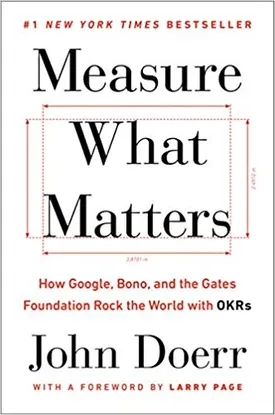Measure What Matters: How Google, Bono, and the Gates Foundation Rock the World With OKRs by John Doerr
Google, Bono and the Bill & Melinda Gates Foundation have used the same system to shape their success: Objectives and Key Results, or OKRs. In his book “Measure What Matters: How Google, Bono, and the Gates Foundation Rock the World With OKRs”, John Doerr reveals the secrets to this system and how to use it to help us all reach our potential and improve our lives.
Doerr has been a leader in technology since the late 1960s and an investor since the late 1970s. He holds a degree in Electrical Engineering from Rice University and has over forty years of experience in nearly every high-growth industry. After he joined venture capital firm Kleiner, Perkins, Caufield & Byers, Doerr became an early investor in technology’s most influential companies and products, like Google, Amazon and Twitter. In “Measure What Matters”, he shares his lessons for developing objectives and key results and provides a step-by-step guide for rearing high-performance organizations.
At its core, OKRs are a way of managing and measuring progress. They focus on setting ambitious goals and then tracking the progress of your team. “Measure What Matters” delves into this system and how to best use it to achieve your objectives. Doerr takes readers through the basics of OKRs and then moves into advanced topics like creating and using ‘big hairy audacious goals’ (BHAGs), building trust and holding employees accountable for their objectives.
Doerr demonstrates how this system was used by companies like Google and by philanthropies like the Gates Foundation to achieve success. Google combined OKRs with their ‘ moonshot’ mentality to help shape their success. The Gates foundation used OKRs to define ambitious goals and held themselves accountable for meeting them. Even U2 singer Bono used this system to help reduce extreme poverty around the world.
In ‘Measure What Matters’, Doerr outlines a nine-step process for establishing and running OKRs in organizations. He covers topics such as crafting objectives and key results, applying OKRs to existing goals, and learning to trust the process. Doerr contributes his own insights, stories, and experiences of using OKRs. This gives his advice depth and credibility.
Doerr’s book is essential reading for leaders who want to tap the potential of the powerful OKR system. It provides tips on shaping objectives, setting ambitious key results, and using OKRs to track progress. By using Doerr’s guidance and insights, readers can improve the performance of their business and organization by embracing successful tactics and approaches. ‘Measure What Matters’ is a valuable resource which is sure to help many organizations to reach their highest potential.

